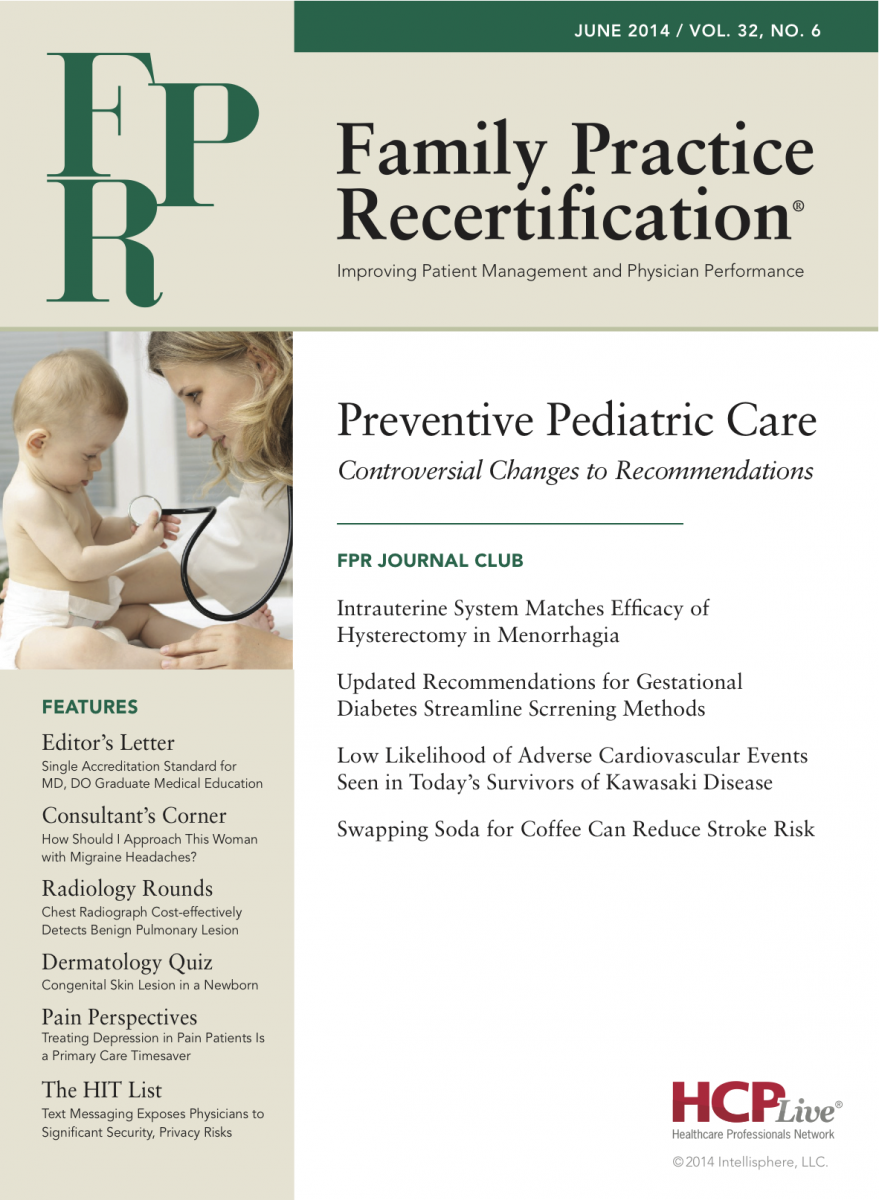Treating Depression in Pain Patients Is a Primary Care Timesaver
Regardless of a primary care provider's situation, depression in patients with chronic pain cannot be ignored.

Michael E. Schatman, PhD, CPE
Due to tectonic shifts in the method in which medical practices operate, time is of the essence now more than ever before. Complaints from physicians and patients alike regarding the “rushed” feeling of the clinical encounter currently abound as a result of decreasing insurance reimbursements — and PCPs, in particular, are under the gun.
According to one 2008 study, the length of primary care office visits increased from 17 to 21 minutes between 1997 and 2005. While this isolated figure is encouraging, the number of clinical concerns addressed at each visit increased from 5.4 to 7.1, which resulted in a decrease in the average amount of time spent per concern, from 4.4 to 3.8 minutes.1
Although this is certainly problematic for all primary care patients and frustrating for all PCPs, the “time crunch” issue becomes particularly distressing when patients who suffer from chronic pain are involved. This might be the case because the vast majority of patients with chronic pain are depressed,2 so these individuals have more clinical concerns to address at primary care office visits than other patients, thereby necessitating more time with PCPs.3
Extended visits for the increasing chronic pain population are certainly not realistic on an ongoing basis, as the United States is already experiencing a severe shortage of PCPs4 that is expected to become more pronounced over the coming years.5 Furthermore, if every PCP provided every chronic pain sufferer with lengthy appointments each time they met, the financial viability of their practices would quickly deteriorate.
To remedy this dilemma, I propose a practical and ethical approach. In most settings where PCPs work, licensed psychiatrists and psychologists are available for consultation. While some chronic pain patients may be uncomfortable with the perceived stigma associated with receiving mental health treatment, it would be wise for a savvy and compassionate PCP to educate them on the importance of addressing their comorbid issues to ultimately gain control of their pain and experience an enhanced quality of life.6
Due to a lack of availability, mental health referral is not always practical for the numerous PCPs who practice in underserved areas of the United States. However, such PCPs can work with antidepressant medications quite effectively and provide brief counseling, as well. While the combination of psychotropic medications and psychotherapy is more effective than either type of treatment alone, it is important to remember that the literature suggests psychopharmacological intervention is likely more effective than psychotherapy as a monotherapy.7
Regardless of a PCP’s situation, depression in patients with chronic pain cannot be ignored. Although treating these patients may be somewhat more time-consuming, it is important to remember that early and aggressive intervention for a mental health condition is not only going to help the pain patient, but also serve as a timesaver in the long run for the care provider.
References
1. Abbo ED, Zhang Q, Zelder M, Huang ES. The increasing number of clinical items addressed during the time of adult primary care visits. J Gen Intern Med. 2008 Dec;23(12):2058-65. http://www.ncbi.nlm.nih.gov/pmc/articles/PMC2596516/.
2. Poole H, et al. Depression in chronic pain patients: prevalence and measurement. Pain Pract. 2009 May-June;9(3):173-80. http://www.ncbi.nlm.nih.gov/pubmed/19298363.
3. Geraghty EM, Franks P, Kravitz RL. Primary care visit length, quality and satisfaction for standardized patients with depression. J Gen Intern Med. 2007 Dec;22(12):1641-7. http://www.ncbi.nlm.nih.gov/pubmed/17922171.
4. Phillips RL, Bazemore AM, Peterson LE. Effectiveness over efficiency: underestimating the primary care physician shortage. Med Care. 2014;52:97-8. http://www.ncbi.nlm.nih.gov/pubmed/24309674.
5. Green LV, Savin S, Lu Y. Primary care physician shortages could be eliminated through use of teams, nonphysicians, and electronic communication. Health Aff. 2013 Jan;32(1):11—9. http://www.ncbi.nlm.nih.gov/pubmed/23297266.
6. Geisser ME, Roth RS, Robinson ME. Assessing depression among persons with chronic pain using the Center for Epidemiological Studies-Depression Scale and the Beck Depression Inventory: a comparative analysis. Clin J Pain. 1997 Jun;13(2):163-70. http://www.ncbi.nlm.nih.gov/pubmed/9186024.
7. Cuijpers P, et al. The efficacy of psychotherapy and pharmacotherapy in treating depressive and anxiety disorders: a meta-analysis of direct comparisons. World Psychiatry. 2013 Jun;12(2):137-48. http://www.ncbi.nlm.nih.gov/pubmed/23737423.
About the Author
Michael E. Schatman, PhD, CPE, is a clinical psychologist who has spent the past 27 years working in pain management. He is currently the Executive Director of the Foundation for Ethics in Pain Care in Bellevue, WA, where he also maintains a part-time practice in pain psychology. Schatman is the author of more than 80 peer-reviewed and invited journal articles and book chapters on pain management, and he lectures regularly on both local and national bases. He is the editor of Ethical Issues in Chronic Pain Management and Chronic Pain Management: Guidelines for Multidisciplinary Program Development, both of which were released in 2007. Currently, he is Editor-in-Chief of the Journal of Pain Research, Ethics Section Head Editor of Pain Medicine and Psychological Injury & Law, and Deputy Editor-in-Chief of the International Journal of Cannabinoid Medicine. Schatman serves on the Board of Directors of the American Society of Pain Educators, which named him 2011 Clinical Pain Educator of the Year.
